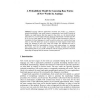31 search results - page 2 / 7 » Discovering Word Meanings Based on Frequent Termsets |
ISI
2006
Springer
13 years 4 months ago
2006
Springer
Abstract. Those who want to conceal the content of their communications can do so by replacing words that might trigger attention by other words or locutions that seem more ordinar...
CICLING
2008
Springer
13 years 6 months ago
2008
Springer
Language software applications encounter new words, e.g., acronyms, technical terminology, loan words, names or compounds of such words. Looking at English, one might assume that t...
DEXA
2008
Springer
13 years 6 months ago
2008
Springer
Abstract. Industrial, scientific, and commercial applications use information systems to trace the execution of a business process. Relevant events are registered in massive logs a...
CORR
2002
Springer
13 years 4 months ago
2002
Springer
The first morphological learner based upon the theory of Whole Word Morphology (Ford et al., 1997) is outlined, and preliminary evaluation results are presented. The program, Whol...
ESWA
2007
13 years 4 months ago
2007
Hidden Markov Models, or HMMs for short, have been recently used in Bioinformatics for the classification of DNA or protein chains, giving rise to what is known as Profile Hidde...

